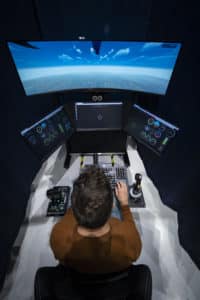IHMC researchers to help build testing environment to improve operator awareness.
Published 4.10.23
IHMC received nearly $4 million in grant funding as a subaward to SRI International’s “PROTEUS: Prototype Testing environment for User Situation awareness.”

PROTEUS is a rapidly reconfigurable human-machine interface (HMI) testing environment for early and cost-effective testing of human machine prototypes, specifically those designed to improve operator situation awareness and support agile adaptation to off-nominal situations.
The PROTEUS Team is a project the Defense Advanced Research Projects Agency and is a collaboration between SRI International (prime, headquartered in Menlo Park, CA), IHMC, and SkillMil, Inc., (Menlo Park, CA). IHMC’s effort is led by Senior Research Scientist Dr. Anil Raj.
PROTEUS will develop and provide a set of plug-and-play, low-cost hardware configurations to support ecologically realistic environments across operational domains (e.g., air, maritime, space).
The PROTEUS team will create a testbed design for conducting human research participant experiments, and execute protocols designed to deliver statistically significant operator situation awareness and performance assessment results in less than one week per iteration (“Evaluation Events”). Raj is responsible for conducting the Evaluation Events at IHMC.
As it stands, creating a testbed for a new scenario that could sustain more than 30 in-person and 90 virtual participants typically takes weeks or months. With technologies developed under the PROTEUS project, the team believes they can cut that time to a few days per new scenario.
Increasing the number of design and testing iterations an HMI can go through before deployment has a major influence on its effectiveness. Making the iteration process faster and more efficient should pay dividends in the end.
The PROTEUS concept includes
· On-site multimodal, rapidly reconfigurable fixed-base simulators as well as web-hosted “virtual” testbeds that enable remote users to participate in HMI evaluations.
· Visual editors that enable collaborative development.
· Build-time capabilities will include automated code generators to construct testbed-ready “instrumented” HMI prototypes used for functional and stress testing ahead of evaluation events.
· Modeling technology that requires minimal calibration and extends diagnostic information for emotional and physiological state assessment (drowsiness, frustration).
· Off nominal events and situation awareness assessment queries will be embedded in each scenario to test HMI support of graceful adaptation and impact on situation awareness.
· PROTEUS will track and display operator attention dynamics using gaze-trackers (on-site testbeds) and webcams (remote), as well as task performance and situation awareness metrics in real time.
The grant runs through 2025.
This story is approved for public release by DARPA, with unlimited distribution.
IHMC is a not-for-profit research institute of the Florida University System where researchers pioneer science and technology aimed at leveraging and extending human capabilities. IHMC researchers and staff collaborate extensively with the government, industry and academia to help develop breakthrough technologies. IHMC research partners have included: DARPA, the National Science Foundation, NASA, Army, Navy, Air Force, National Institutes of Health, IBM, Microsoft, Honda, Boeing, Lockheed, and many others.
Latest News
- David Bear joins IHMC Board of Directors
- STEM-Talk: Michael Schmidt on building a space-faring civilization
- Florida Blue award supports health and wellness research and outreach at IHMC
- STEM-Talk: Ken Forbus on AI and his development of the Structure Mapping Engine
- STEM-Talk: Pascal Lee on returning to the Moon — and heading to Mars
- Aging Symposium draws experts to IHMC
- IHMC hosts Fredric G. Levin Lung Care Symposium March 27-28 in Pensacola
- Humanoid robotics and exoskeletons lead latest IHMC newsletter
- Celebrate Robotics Week at IHMC Open House on April 11, 2025

